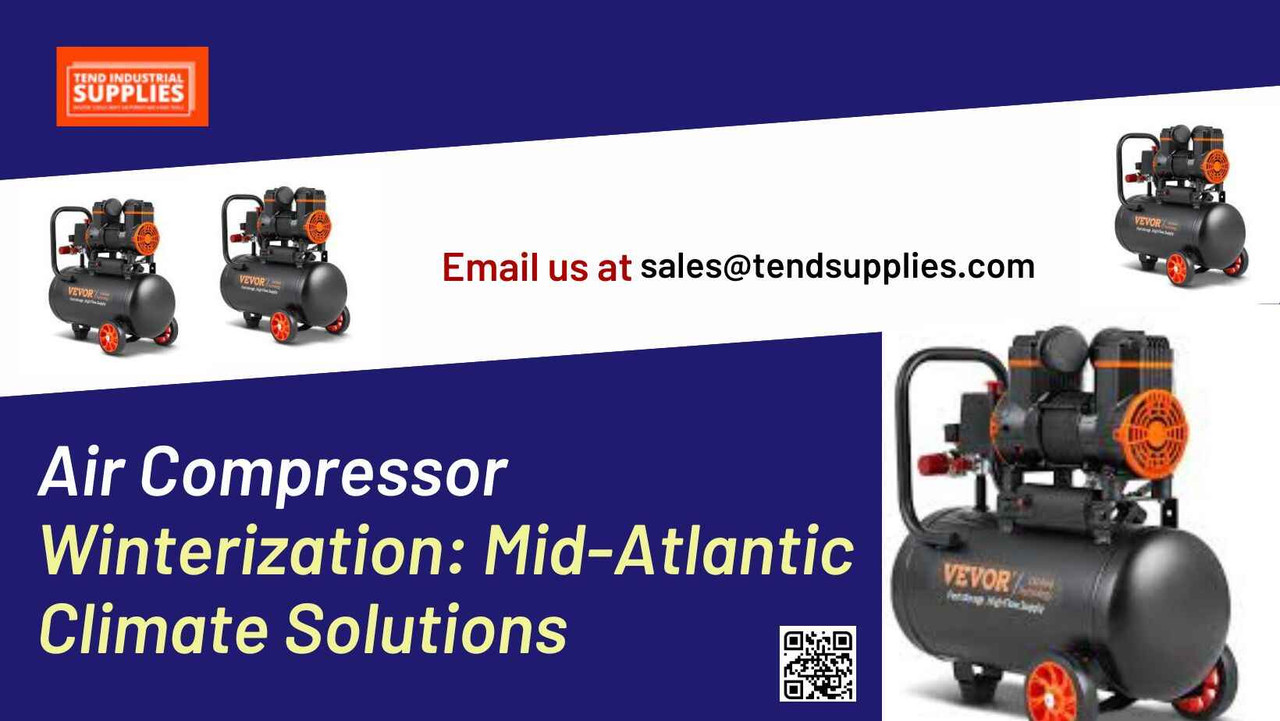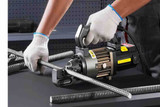Air Compressor Winterization: Mid-Atlantic Climate Solutions
Key Takeaway
Successful air compressor winterization in the Mid-Atlantic region requires a comprehensive approach that addresses moisture control, freeze protection, and operational efficiency while considering specific regional climate variations.
The Mid-Atlantic region experiences a unique climate—humid summers, chilly winters with fluctuating temperatures, and occasional blasts of snow and ice. This can be tough on your air compressor, especially if it's located outdoors or in an unheated space. But don't let Old Man Winter put your compressor out of commission! With the right winterization techniques, you can keep it running smoothly all season long.
Introduction
The Mid-Atlantic region's variable winter climate presents unique challenges for air compressor operation and maintenance. From Maryland's coastal humidity to Pennsylvania's freezing temperatures, proper winterization is crucial for maintaining optimal performance and preventing costly repairs.
Why Winterization Matters
Cold temperatures can wreak havoc on your air compressor in several ways:
- Condensation Freeze: Moisture builds up in the tank and lines, and when it freezes, it can cause blockages, damage valves, and even crack the tank.
- Oil Thickening: Cold temperatures thicken the compressor oil, reducing its lubricating properties and putting extra strain on the motor.
- Hose Damage: Hoses can become brittle and crack in the cold, leading to leaks and reduced performance.
Winterization Steps for the Mid-Atlantic
- Location, Location, Location: If possible, move your compressor indoors or to a sheltered area. A garage or shed can provide some protection from the elements.
- Insulation is Key: Insulate the tank and exposed pipes with foam insulation or heat tape. This helps maintain consistent temperatures and prevents freezing.
- Drain the Tank Religiously: Moisture is the enemy! Drain the tank after each use, especially before a cold snap. Consider installing an automatic drain valve for added convenience.
- Mind Your Oil: Use synthetic oil designed for cold weather operation. It flows better at low temperatures and provides superior lubrication.
- Protect Your Hoses: Inspect hoses for cracks and replace any damaged ones. Consider using cold-weather hoses designed for flexibility in freezing temperatures.
- Dry the Air: A quality air dryer removes moisture from the compressed air, preventing freeze-ups in the lines and tools. This is especially important in the humid Mid-Atlantic.
- Anti-Freeze Protection: In extremely cold conditions, add air compressor anti-freeze to the tank to prevent freezing. Follow the manufacturer's instructions carefully.
- Regular Maintenance: Keep up with regular maintenance, including air filter changes and belt inspections. A well-maintained compressor is better equipped to handle winter weather.
Extra Tips for the Mid-Atlantic
- Temperature Swings: The Mid-Atlantic is known for fluctuating temperatures. Be prepared for sudden cold snaps even during milder periods.
- Humidity: High humidity can exacerbate condensation problems. Ensure proper ventilation around the compressor.
- Salt and Corrosion: If your compressor is exposed to road salt or coastal environments, take extra steps to protect it from corrosion. Rinse it regularly and apply a protective coating.
Don't Hibernate Your Compressor
With a little preparation and care, your air compressor can power through the Mid-Atlantic winter with ease. By following these winterization tips, you'll ensure its longevity, prevent costly repairs, and keep your projects moving forward, no matter how low the temperature drops.
Regional Climate Considerations
Maryland's Coastal Challenges
Maryland's proximity to the Chesapeake Bay creates unique winterization needs:
- High humidity levels even in winter
- Frequent temperature fluctuations
- Salt air exposure in coastal areas
- Mixed precipitation conditions
Recommended solutions for Maryland facilities include:
- Enhanced moisture separation systems
- Corrosion-resistant components
- Heated air intake systems
- Regular condensate drainage
Virginia's Variable Conditions
Virginia experiences diverse winter conditions requiring:
- Flexible temperature management
- Altitude considerations for mountain facilities
- Humidity control in coastal areas
- freeze protection for overnight operations
Delaware's Maritime Environment
Delaware's industrial facilities face:
- Heavy coastal moisture
- Salt air exposure
- Rapid temperature changes
- Winter storm preparations
New Jersey's Industrial Requirements
New Jersey facilities need to address:
- Urban pollution factors
- Coastal humidity
- Industrial heat management
- Extended cold periods
Comprehensive Winterization Steps
1. System Assessment
- Complete pressure testing
- Leak detection
- Intake system evaluation
- Drainage system inspection
2. Moisture Management
- Install heated air dryers
- Implement multi-stage filtration
- Add moisture separators
- Upgrade condensate management
3. Freeze Protection
Temperature management solutions:
- Heat trace critical lines
- Insulate exposed piping
- Install thermostat controls
- Implement cold weather lubricants
4. Location-Specific Preparations
Indoor Installations
- Maintain ambient temperature above 40°F
- Ensure proper ventilation
- Monitor humidity levels
- Install temperature alarms
Outdoor Installations
- Weather-protective enclosures
- Heated cabinets
- Wind protection
- Elevated mounting
Essential Maintenance Schedule
Daily Winter Checks
- Drain moisture traps
- Monitor oil levels
- Check intake filters
- Record operating temperatures
Weekly Maintenance
- Inspect belt tension
- Clean air filters
- Test safety systems
- Check heating elements
Monthly Procedures
- Complete system inspection
- Lubricant analysis
- Performance testing
- Electrical system check
Performance Optimization
Energy Efficiency
- Insulation upgrades
- Heat recovery systems
- Efficient start-up procedures
- Operating schedule optimization
Capacity Management
- Load sharing systems
- Variable speed control
- Pressure optimization
- Demand monitoring
Emergency Preparedness
Power Outage Protection
- Backup power systems
- Emergency shutdown procedures
- Restart protocols
- Critical system protection
Extreme Weather Procedures
- Storm preparation checklist
- Emergency contact list
- Backup equipment access
- Recovery procedures
Technical Specifications
Temperature Management
Operating temperature ranges:
- Minimum start-up: 35°F
- Optimal operation: 45-75°F
- Maximum allowed: 100°F
- Lubricant requirements: -10°F to 120°F
Moisture Control
Recommended specifications:
- Dew point suppression: 20°F
- Relative humidity target: <30%
- Drain intervals: 2-4 hours
- Filter efficiency: 99.9%
Industry-Specific Solutions
Manufacturing Facilities
- Continuous operation requirements
- Process air quality standards
- Energy recovery systems
- Backup capacity planning
Automotive Services
- Intermittent use considerations
- Quick recovery needs
- Portable system protection
- Tool-specific requirements
Construction Sites
- Mobile equipment protection
- Temporary installation guidelines
- Rapid deployment solutions
- Environmental protection
Mid-Atlantic Air Compressor Success Stories and Applications
Manufacturing Case Studies
Maryland Pharmaceutical Manufacturing
A leading pharmaceutical manufacturer in Maryland implemented our winterization recommendations, resulting in:
- 45% reduction in moisture-related issues
- 28% energy savings during winter months
- Zero cold-weather shutdowns
- Improved air quality metrics
Implementation Results
Winter Performance Metrics: Before Winterization:
- Downtime: 72 hours/winter
- Energy costs: $12,000/month
- Moisture issues: 15 incidents
After Winterization:
- Downtime: 4 hours/winter
- Energy costs: $8,640/month
- Moisture issues: 2 incidents
Regional Application Guide
Climate-Specific Solutions
| Region | Challenge | Solution | Results |
| Coastal Maryland | High humidity | Enhanced moisture separation | 90% reduction in moisture |
| Mountain Virginia | Temperature fluctuation | Automated temp control | 85% fewer cold starts |
| Delaware Ports | Salt air exposure | Corrosion protection | 3x longer system life |
| Urban New Jersey | Space constraints | Compact system design | 40% space |
Frequently asked questions
1. How often should I drain my air compressor system in winter?
In Mid-Atlantic winter conditions, drain moisture traps at least twice daily. Coastal locations in Maryland and Delaware may require more frequent draining, up to every 4 hours during high humidity periods.
2. What's the best way to prevent frozen air lines?
Install heat trace systems on exposed lines, maintain proper slope for drainage, use automatic drain valves, and consider adding antifreeze systems for critical applications. Keep indoor temperatures above 40°F.
3. Should I change my compressor oil for winter operation?
Yes, switch to synthetic oil with a lower viscosity rating for winter operation. This ensures proper lubrication during cold starts and maintains efficiency in low temperatures.
4. How can I protect my outdoor compressor from winter storms?
Install a weather-protective enclosure with heating, ensure proper elevation above snow level, implement automatic drain systems, and establish emergency shutdown procedures for severe weather.
5. What size air compressor do I need for winter operations?
Size your compressor 15-20% larger than summer requirements to account for winter inefficiencies and increased moisture handling needs. Consider load sharing for critical operations.
Related Articles
- The Best Air Compressors for Powering Tools in New Jersey's Cold Weather
- Maintenance Tips for Air Compressors in Winter
- Seasonal Maintenance Tips for Air Compressors in New Jersey's Variable Climate
- Best Air Compressor for Home Garage
- Energy Efficiency in Air Compressors: What to Look For
Investment Protection
Proper winterization protects your air compressor investment and ensures reliable operation throughout the cold season. Consider these long-term benefits:
- Extended equipment life
- Reduced maintenance costs
- Improved operational efficiency
- Enhanced system reliability
Conclusion
Don't wait for winter to impact your air compressor system. Contact Tend Industrial Supplies today for a comprehensive winterization assessment and solutions tailored to your specific location and application. Our experts understand the unique challenges of Mid-Atlantic winters and can help protect your valuable equipment.
Shop Air Compressors and Winterization Supplies
Schedule your winter preparation consultation today by calling [phone number] or visiting our showroom. Let us help you maintain peak performance throughout the winter season.









